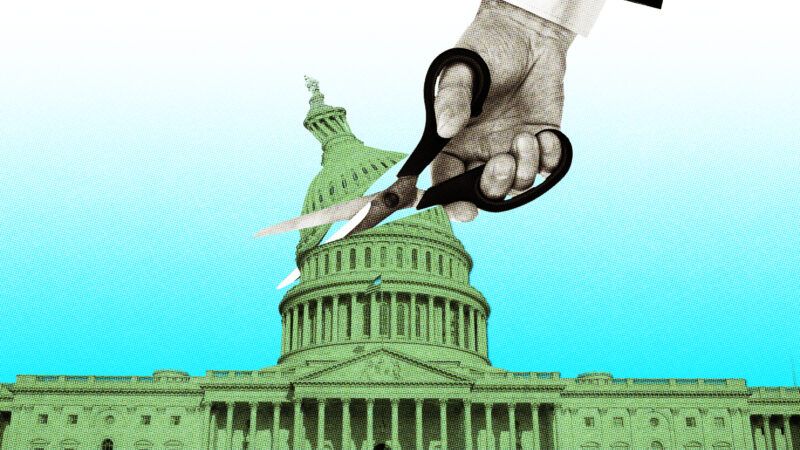Cutting Government Back to Last Year's Size Shouldn't Be 'Impossible' or 'Severe'
Taking stock of the utterly unserious fiscal policy discourse in Washington.

As part of a deal struck between House Speaker Kevin McCarthy (R–Calif.) and the fractious House Freedom Caucus, Republicans in Congress have pledged to return federal discretionary spending to 2022 levels.
As a practical matter, that would require cutting about $130 billion out of the federal budget next year. But it's probably more useful to think about the maneuver as an attempt to rescind the spending increases included in the omnibus bill that Congress rushed to pass in the final weeks of last year. That bill set spending levels for the 2023 fiscal year, so promising to return to the 2022 spending level amounts to a promise to undo that omnibus bill and not replace it with more spending hikes.
In a more normal place, this would be described as what it is: a promise to hold government spending level. The federal government spent about $1.7 trillion on discretionary programs in 2022, and Republicans are saying they'd like to spend the same amount next year.
In Washington, D.C., however, this is viewed with a combination of shock and horror.
The idea of shrinking the discretionary portion of the government back to the size that it was literally just a month ago is "impossible," according to Politico reporters Caitlin Emma and Connor O'Brien (and their congressional sources), who describe the Republican plan to hold discretionary funding level as relying on "severe cuts" and say the futility of the exercise would "put Don Quixote to shame."
Theirs is perhaps the most outlandish example of the deeply unserious world of fiscal policy discourse, but it hardly stands alone. The budget rules adopted earlier this week by the new Republican majority in the House lay a foundation for "massive spending cuts," according to Roll Call. The Washington Post describes the budget plan with similar language, before noting a few paragraphs later that Republicans are merely seeking a return to the status quo of 2022.
Yes, the Dark Ages of 2022, when the government spent a mere $1.7 trillion on discretionary programs. My goodness, how could we ever consider rolling things back that far?
Of course, there are plenty of good reasons to be skeptical that McCarthy's promise will be fulfilled. For one, there's a Democratic majority in the Senate and Joe Biden still resides in the White House.
For another, well, even many Republicans don't seem very interested in actually sticking to the deal. Rep. Steve Womack (R–Ark.), a member of the Appropriations Committee, tells Politico that returning the budget to 2022 levels may not be "politically doable"—that's Washington-speak for "won't make Republican-aligned special interests happy." And sure enough, other Republicans are already trying to weasel out of forcing the Pentagon to be subject to the same budget rules as everyone else.
There is, to be fair, plenty of room to criticize Republicans' budget plans from a tactical perspective. Tying the discretionary budget cuts to the debt ceiling increase, as Republicans seem primed to do, runs the risk of credit default and serious economic consequences for the country.
But observers should be able to separate those tactics from the underlying demand, which should not only be doable but actually makes a lot of sense considering the projected growth of future budget deficits.
And here's the really crazy thing: Even if Congress did somehow manage to hold the discretionary spending level next year, overall spending would still increase. That's because the $1.7 trillion discretionary budget is only a fraction of federal spending. Other items—like the so-called mandatory spending on entitlements like Social Security and Medicare as well as the rapidly expanding interest costs connected to the $31 trillion national debt—will continue to grow and drive federal deficits higher.
And if you think that simply not increasing spending is "impossible," wait until you see what it would take to actually balance the budget. According to a new analysis from the Committee for a Responsible Federal Budget, all spending would need to be cut by roughly 25 percent to balance the federal budget within 10 years. If the Pentagon and entitlement programs aren't included in those cuts, the discretionary budget would have to be reduced by an actually shocking 85 percent.
Now that's something that might put the Man of La Mancha to shame.
Asking the federal government to operate with the same levels of funding as it had in 2022 shouldn't be seen as impossible or insane. It should be a starting point.


Show Comments (48)